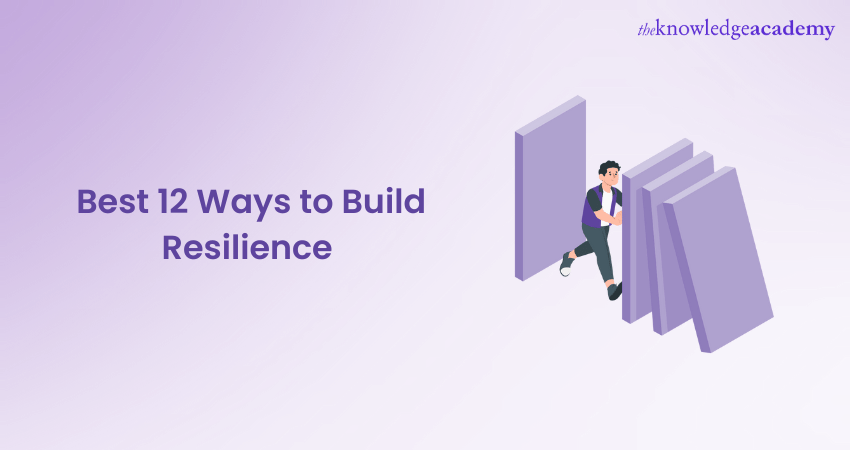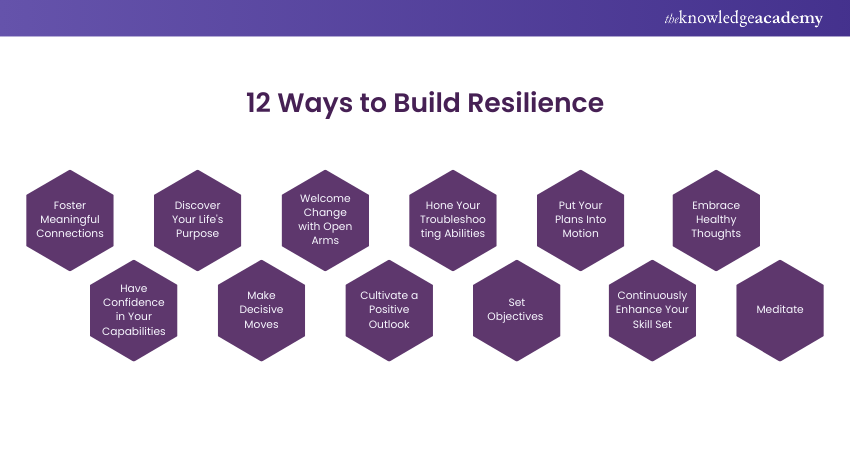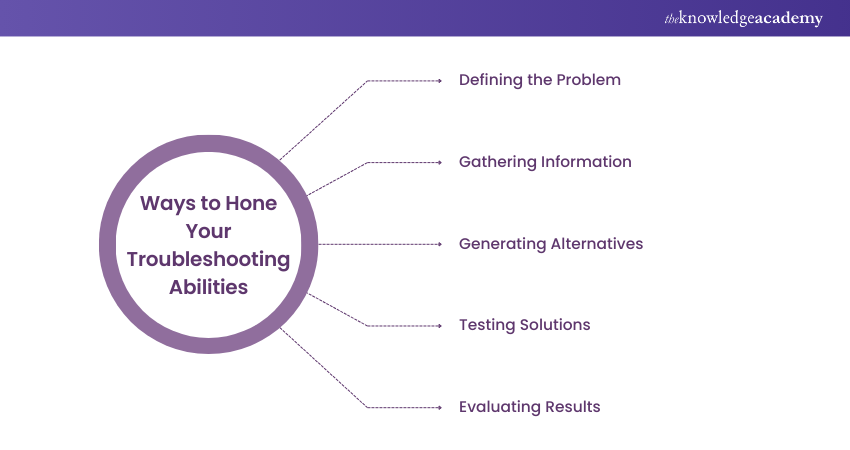We may not have the course you’re looking for. If you enquire or give us a call on +45 89870423 and speak to our training experts, we may still be able to help with your training requirements.
Training Outcomes Within Your Budget!
We ensure quality, budget-alignment, and timely delivery by our expert instructors.

Resilience is the ability to bounce back from adversity and cope with stress. It is not something you are born with, but something you can learn and improve. Resilience helps you face difficulties with courage and optimism and adapt to changing circumstances. In this blog, you will discover 12 Ways to Build Resilience and how they can benefit you in various aspects of your life.
Table of Contents
1) What is Resilience?
2) 12 Ways to Build Resilience
a) Foster Meaningful Connections
b) Have Confidence in Your Capabilities
c) Discover Your Life's Purpose
d) Make Decisive Moves
e) Welcome Change with Open Arms
f) Cultivate a Positive Outlook
g) Hone Your Troubleshooting Abilities
h) Set Objectives
i) Put Your Plans Into Motion
j) Continuously Enhance Your Skill Set
3) Conclusion
What is Resilience?
Resilience is a psychological concept that refers to the ability to recover from negative emotions and events, such as trauma, loss, failure, or disappointment. Resilience is not about avoiding or denying problems but finding ways to deal with and grow from them.
Resilience is a dynamic process that entails cognitive, emotional, and behavioural skills. Various factors, such as personality, environment, social support, and coping strategies can influence emotional Resilience.

12 Ways to Build Resilience
In this section, we will explore the twelve Ways to Build Resilience in detail. Let's take a look at them below:

Foster Meaningful Connections
One of the most effective Ways to Build Resilience is to have strong and supportive relationships with others. Having people who care about you, listen to you, and help you can make you feel less alone and more confident. You can foster meaningful connections by reaching out and by expressing gratitude, appreciation, and empathy to the following people:
1) Your family
2) Friends
3) Colleagues
4) Community members
You can also get professional help or join a support group if you need more guidance and assistance.
Have Confidence in Your Capabilities
Another way to build Resilience is to believe in yourself and your abilities. Confidence in your capabilities can help you overcome self-doubt, fear, and insecurity and take on challenges with enthusiasm and determination.
You can have confidence in your capabilities by acknowledging your strengths and achievements, setting realistic and attainable goals, and learning from your mistakes and feedback. You can also increase your self-esteem by practising positive affirmations, self-compassion, and self-care.
Discover Your Life's Purpose
Finding your life’s purpose builds Resilience by providing direction, motivation, and fulfillment. Aligning actions with values and passions becomes easier. Reflect on your values, talents, and aspirations while exploring new experiences. Create a mission statement or vision board to guide and inspire your journey toward a meaningful life.
Make Decisive Moves
Making decisive moves is another way to build Resilience, as it can help you take control of your situation and act on your goals. Instead of avoiding or procrastinating on your problems, you can make decisive moves by identifying the root causes, analysing the possible solutions, and choosing the best course of action.
You can also make decisive moves by breaking down your objectives into smaller and manageable steps, tracking your progress, and celebrating your successes.
Master the art of sentiment analysis with our Sentiment Analysis Training – Sign up now!
Welcome Change with Open Arms
Welcoming change with open arms is another way to build Resilience, as it can help you adapt to new and unexpected circumstances and embrace new opportunities and possibilities. Instead of resisting or fearing change, you can welcome change with open arms by being flexible, curious, and open-minded.
You can also welcome change with open arms by preparing for potential changes, learning new skills and knowledge, and seeking new perspectives and insights.
Cultivate a Positive Outlook
Promoting positivity is another aspect of developing Resilience because people who cultivate positive thinking have a positive attitude toward stress and are confident in dealing with adversity. Positive thoughts are the complete opposite of negative thoughts which means that instead of dwelling on the negative or undesirable aspects of a situation you can seek the positive side, laugh, or thank.
It is also recommended to control positive outlook through being mindful or meditating or doing any form of relaxation exercise and disputing negative attitudes and beliefs.
Hone Your Troubleshooting Abilities
Honing your troubleshooting abilities is another way to build Resilience, as it can help you solve problems effectively and efficiently. Good troubleshooting abilities can help you identify and fix errors, prevent or minimise damages, and improve your performance and quality.

You can hone your troubleshooting abilities by following a systematic and logical approach, such as defining the problem, gathering information, generating alternatives, testing solutions, and evaluating results. You can also hone your troubleshooting abilities by learning from experts, peers, or online resources.
Set Objectives
Setting objectives is another way to build Resilience, as it can help you plan your actions and measure your outcomes. Having clear and specific objectives can help you focus your efforts, prioritise your tasks, and track your progress.
You can set objectives using Specific, Measurable, Achievable, Relevant and Time-bound (SMART) criteria. Using the Objectives and Key Results (OKR) framework, you can also set objectives.
Put Your Plans Into Motion
Another way of developing Resilience is by getting your plans implemented as you can be able to set methods, actions and resolve to achieve your outcomes. Such a plan can assist in organising resources, time and overcoming hurdles.
To put your plans into practice, there are four steps known as the Plan, Do, Check, and Act (PDCA) cycle. The other plan that you can use to execute your plans is through the use of Gantt Chart which is a graphical layout of a project schedule.
Enhance your Emotional Intelligence with our Emotional Intelligence Training – Sign up today!
Continuously Enhance Your Skill Set
Enhancing your skill set is another way to Build Resilience, as it can help you improve your competencies and expand your opportunities. A diverse and updated skill set can help you adapt to changing demands, perform better, and advance your career.
You can continuously enhance your skill set by identifying your skill gaps, setting your learning goals, and choosing your learning methods. You can also continuously enhance your skill set by seeking feedback, mentoring, coaching, and applying your learning to real situations.
Embrace Healthy Thoughts
Focus on positive thinking and challenge negative thoughts. Practice gratitude by acknowledging the good things in life. This helps build a more optimistic outlook, which can improve mental Resilience, making it easier to cope with stress and adversity. Surround yourself with optimistic people and engage in activities that bring joy.
Meditate
Dedicate time each day to meditate. This practice calms the mind, reduces stress, and enhances focus. Regular meditation can improve emotional stability and Resilience, helping to manage life's challenges more effectively and maintain a sense of inner peace. Try meditation techniques to discover what suits you best and create a calm space for your practice.
Conclusion
We hope you read and understand the 12 Ways to Build Resilience. It is a vital skill that can help you cope with stress and overcome life challenges. By following the 12 ways discussed in this blog, you can develop a resilient mindset and achieve your goals effectively.
Learn the importance of developing Resilience with our Resilience Training – Join today!
Frequently Asked Questions

Resilience can have an impacts on your physical, mental and, emotional state. Some of these benefits are the stress, anxiety, and depression relief, improved happiness and satisfaction , a healthy immune system, and improved and optimised performance.

There are various tools and tests that can help you to measure your Resilience level. It includes the Resilience Scale, the Connor-Davidson Resilience Scale, the Brief Resilience Scale, the Resilience Questionnaire, and the Resilience Quotient. These tools and tests can help you to assess your Resilience skills and to identify your areas of improvement.

The Knowledge Academy takes global learning to new heights, offering over 30,000 online courses across 490+ locations in 220 countries. This expansive reach ensures accessibility and convenience for learners worldwide.
Alongside our diverse Online Course Catalogue, encompassing 19 major categories, we go the extra mile by providing a plethora of free educational Online Resources like News updates, Blogs, videos, webinars, and interview questions. By tailoring learning experiences further, professionals can maximise value with customisable Course Bundles of TKA.

The Knowledge Academy’s Knowledge Pass, a prepaid voucher, adds another layer of flexibility, allowing course bookings over a 12-month period. Join us on a journey where education knows no bounds.

The Knowledge Academy offers various Personal Development Courses, including Resilience, Emotional Intelligence, and Sentiment Analysis Training. These courses cater to different skill levels, providing comprehensive insights into Competitive Intelligence Process.
Our Business Skills Blogs cover a range of topics related to Resilience, offering valuable resources, best practices, and industry insights. Whether you are a beginner or looking to advance your Business Skills, The Knowledge Academy's diverse courses and informative blogs have you covered.
Upcoming Business Skills Resources Batches & Dates
Date
 Resilience Training
Resilience Training
Fri 28th Feb 2025
Fri 4th Apr 2025
Fri 27th Jun 2025
Fri 29th Aug 2025
Fri 24th Oct 2025
Fri 5th Dec 2025







 Top Rated Course
Top Rated Course


 If you wish to make any changes to your course, please
If you wish to make any changes to your course, please


